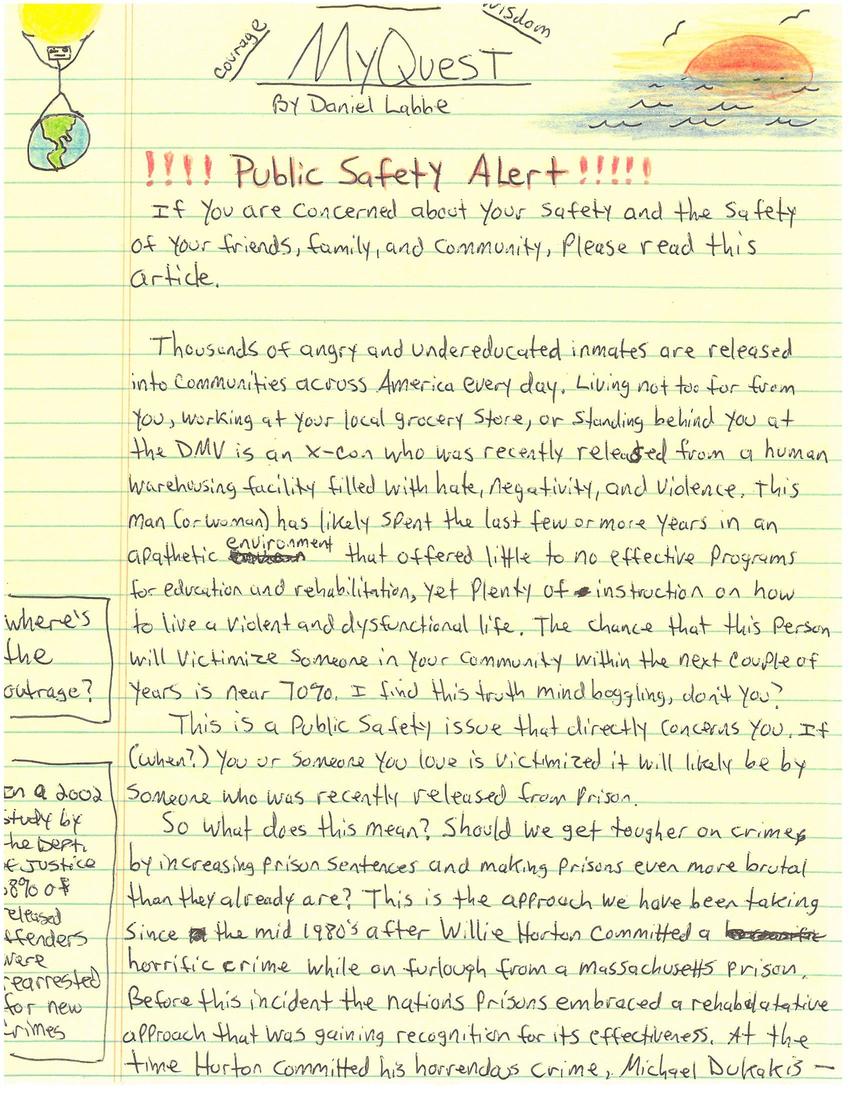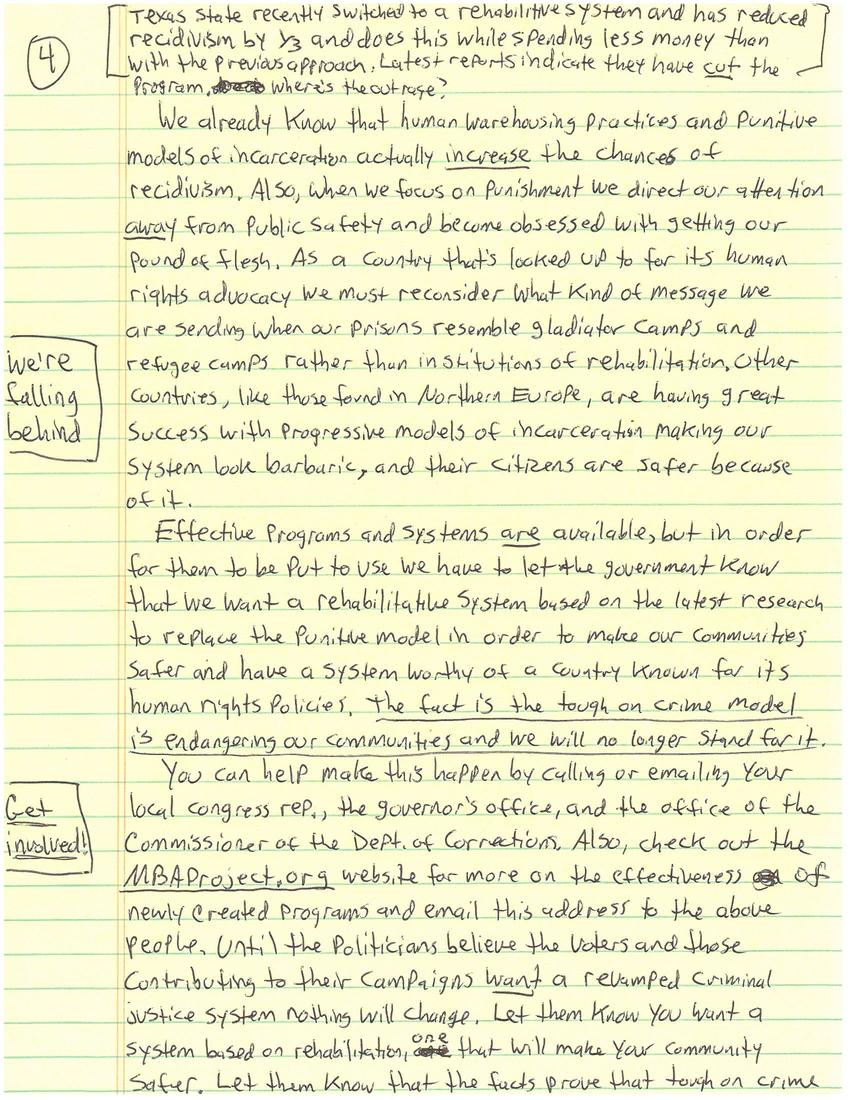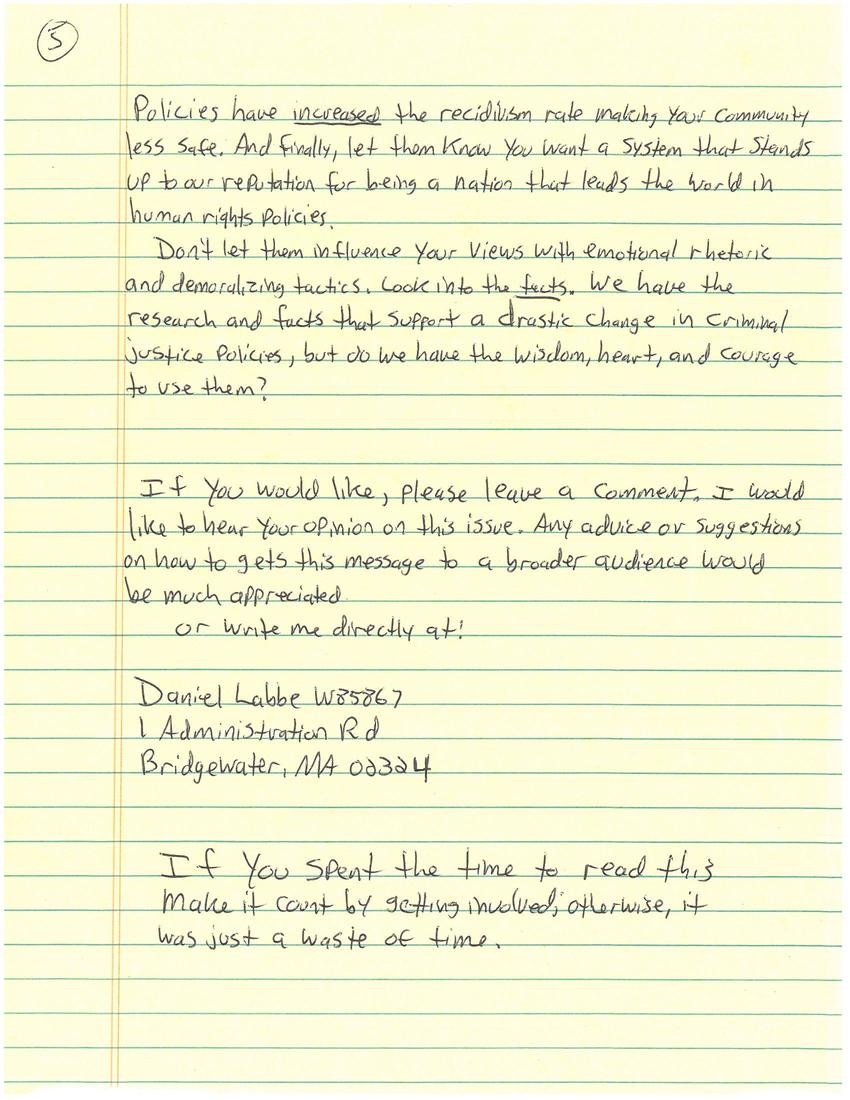Transcription
Courage - Wisdom
My Quest
By Daniel Labbe
!!!!Public Safety Alert!!!!!
If you are concerned about your safety and the safety of your friends, family, and community, please read this article.
Thousands of angry and undereducated inmates are released into communities across America every day. Living not too far from you, working at your local grocery store, or standing behind you at the DMV is an ex-con who was recently released from a human warehousing facility filled with hate, negativity, and violence. This man (or woman) has likely spent the last few or more years in an apathetic environment that offered little to no effective programs for education and rehabilitation, yet plenty of instruction on how to live a violent and dysfunctional life. The chance that this person will victimize someone in your community within the next couple of years is near 70%. I find this truth mind boggling, don't you? [Where's the outrage?]
This is a public safety issue that directly concerns you. If (when) you or someone you love is victimized it will likely be by someone who was recently released from prison.
[In a 2002 study by the Dept. of Justice, 68% of released offenders were rearrested for new crimes]
So what does this mean? Should we get tougher on crimes by increasing prison sentences and making prisons even more brutal than they already are? This is the approach we have been taking since the mid 1980s after Willie Horton committed a horrific crime while on furlough from a Massachusetts prison. Before this incident the nation's prisons embraced a rehabilitative approach that was gaining recognition for its effectiveness. At the time Horton committed his horrendous crime, Michael Dukakis - then the governor of Massachusetts - was running for President. His opponent, George Herbert Bush, used the tragedy to paint Michael Dukakis as someone whose "soft on crime" policies were responsible for Horton's actions. The soon-to-be President Bush portrayed himself as a "tough on crime" advocate and won the election by a landslide. From the on anyone seeking votes took on a tough on crime policy, forever changing the criminal justice system.
So how much safer has the tough on crime spree made our communities? Immediately following new tough on crime legislation, violence in America SKYROCKETED, reaching its peak in 1994 with 1,857,670 violent crimes reported for that year (Federal Bureau of Investigation, Crime in the United States, 2008). The rate of all criminal activity combined has been steadily INCREASING throughout the tough on crime era (World Almanac and Book of Facts, 2010). While I don't have the specific numbers, recidivism in the late 1970s, before tough on crime legislation and when most prisons had a rehabilitative focus, was around 30%. Today that number has jumped to nearly 70%. (Please check the Department of Justice statistics to verify these numbers).
[Truth is hard to ignore, and hard to find on T.V.]
The fact is, TOUGH ON CRIME IS A THREAT TO YOUR SAFETY. But the politicians will never admit this. Why? Because it is much easier to wait for a local or national tragedy to occur (like the Willie Horton case), a time when the public's emotions are running high, and go on television with a snappy soundbite like "We need to be tougher on crime in order to prevent these senseless tragedies", and reap the resulting harvest of votes that will surely come. This is an easy and affective way to gain support, and it allows the candidate to avoid the challenging work of creating truly effective changes in the thorny criminal justice system.
[In 1983 recidivism in Massachusetts was at 23%. Source: Massachusetts D.O.C. Review of Current Research, 1985, Patricia Tobin. The current rate of recidivism is around 50%, but suspected to be higher because the D.O.C. is accused of falsifying release data.]
As a person who once lived a criminal lifestyle and currently lives in prison I can tell you that criminally-minded people don't care about the consequences of their actions while caught-up in street-life, so longer sentences and punishing environments don't affect their decision making process. A drug addict in the throes of withdrawal isn't thinking about the new law increasing prison sentences when he's about to rob a store. Such thinking is merely the rhetoric of politicians.
What longer sentences do accomplish is to make the offender spend MORE time in a prison that promotes hate, violence, and negativity before releasing him to the community. He is now angrier and less capable of managing his life.
[Key point of thought] Unless an offender is doing a natural life sentence he or she will be released back into the community. Knowing this, the question then becomes, what kind of people do we want to be releasing back into our communities after they have served their time? Do we want someone who has lived in an environment of hate and violence for the last few or more years moving into our neighborhood or do we want someone who has spent time in an educational and rehabilitative setting moving in? Either way, they WILL be moving in, so we should consider these questions wisely.
It's time we start being rational rather than emotional when considering the safety of our communities and make use of the mounds of scientific research that indicates the effectiveness of new rehabilitative approaches. We've allowed policy-makers to manipulate us with emotional rhetoric for far too long and there's just no room in the 21st century for such demoralizing tactics, not in a country that claims to be the forerunner of human rights.
[Texas state recently switched to a rehabilitative system and has reduced recidivism by 1/3 and does this while spending less money than with the previous approach. Latest reports indicate they have CUT the program. Where's the outrage?]
We already know that human warehousing practices and punitive models of incarceration actually INCREASE the chances of recidivism. Also, when we focus on punishment we direct our attention AWAY from public safety and become obsessed with getting our pound of flesh. As a country that's looked up to for its human rights advocacy we must reconsider what kind of message we are sending when our prisons resemble gladiator camps and refugee camps rather than institutions of rehabilitation. Other countries, like those found in Northern Europe, are having great success with progressive models of incarceration, making our system look barbaric, and their citizens are safer because of it.
[We're falling behind]
Effective programs and systems ARE available, but in order for them to be put to use we have to let the government know that we want a rehabilitative system based on the latest research to replace the punitive model in order to make our communities safer and have a system worthy of a country known for its human rights policies. The fact is the tough on crime model is endangering our communities and we will no longer stand for it.
[GET INVOLVED!]
You can help make this happen by calling or emailing your local congress rep, the governor's office, and the office of the Commissioner of the Dept. of Corrections. Also, check out the MBAProject.org website for more on the effectiveness of newly created programs and email this address to the above people. Until the politicians believe the voters and those contributing to their campaigns WANT a revamped criminal justice system nothing will change. Let them know you want a system based on rehabilitation, one that will make your community safer. Let them know that the facts prove that tough on crime policies have INCREASED the recidivism rate making your community less safe. And finally, let them know you want a system that stands up to our reputation for being a nation that leads the world in human rights policies.
Don't let them influence your views with emotional rhetoric and demoralizing tactics. Look into the FACTS. We have the research and facts that support a drastic change in criminal justice policies, but do we have the wisdom, heart, and courage to use them?
If you would like, please leave a comment. I would like to hear your opinion on this issue. Any advice or suggestions on how to get this message to a broader audience would be much appreciated.
Or write me directly at:
Daniel Labbe W85867
1 Administration Road
Bridgewater, MA 02324
If you spent the time to read this, make it count by getting involved; otherwise, it was just a waste of time.
Other posts by this author
|
2016 aug 4

|
2016 jun 25

|
2016 jun 9

|
2016 may 5

|
2016 mar 11

|
2016 feb 7

|
More... |







Replies (1)
Your words are so powerful. I'm sending this to my friends and writing to my state representative and senator. Thank you for continuing to voice your views and work towards a better system for everybody!
Susan